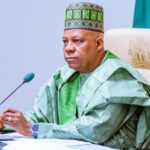Vice President Kashim Shettima has directed the implementation of a sweeping overhaul of Nigeria’s road safety measures.
Shettima gave the directive during a meeting with the leadership of the Federal Road Safety Corps (FRSC) led by its Corps Marshal, Shehu Mohammed, at the Presidential Villa, Abuja, on Friday.
Te Vice President is set to inaugurate the National Road Safety Advisory Council to be saddled with the responsibility of reducing traffic accidents by half before 2030.
- Taraba Govt House renamed after T.Y. Danjuma
- Banditry: You’re the Next To Go Down, Defence Chief Tells Turji
Speaking during the meeting with the FRSC leadership, the VP stressed the urgent need to address the increasing road accidents on the highways and in the cities caused by non-adherence to traffic regulations.
“We need a comprehensive solution for our road safety challenges. The whole ecosystem is not as it should be,” VP Shettima stated, emphasizing the need for “deliberate efforts toward addressing our road challenges,” in line with international best practices in countries like Dubai and the UK.
The Vice President, who chairs the National Road Safety Advisory Council, highlighted the importance of leveraging technology and enforcing discipline to improve road safety.
He said, “In places like Dubai and the UK, they have a mechanism of checking road traffic violators, capture their car number plates and are charged directly from their bank account. This way, people are encouraged to obey the law. We need to be a disciplined nation.”
The Vice President emphasised the interconnected nature of road safety with broader security concerns, saying “The FRSC’s job is intertwined with that of the Nigerian Police as it is part of the security architecture of the nation.”
Earlier, the FRSC Corps Marshal said the National Road Safety Advisory Council is a critical aspect of the updated Nigeria Road Safety Strategy 2021-2030.
“The idea is to reduce road traffic crashes by 50% between now and 2030,” he said.
He outlined the council’s primary functions to include setting national road safety targets, coordinating efforts between federal, state and local governments, and overseeing the implementation of strategic initiatives.

 Join Daily Trust WhatsApp Community For Quick Access To News and Happenings Around You.
Join Daily Trust WhatsApp Community For Quick Access To News and Happenings Around You.


